We will:
- deliver £1 million of investment in our estate
- create an Estate Decarbonisation Plan
- look to transition our waste fleet to HVO
- introduce climate-friendly procurement guidance

As the Leader of the Council and the Cabinet Member for Climate Change, I am delighted to present Bracknell Forest Council’s Climate Change Strategy Annual Report on Progress for 2024 to 2025.
This report outlines the activities and initiatives undertaken and supported by the council to tackle climate change within Bracknell Forest and help us to deliver on our current Climate Change Strategy (2020 to 2024). Throughout this last year though a new ambitious Climate Change Strategy - which will take us from 2025 to 2030 - has been developed to galvanise and accelerate our climate action. The ambition of this new strategy reflects our commitment to achieve net-zero emissions as close to 2030 as possible, and the key role that the council needs to play in coordinating and enabling climate action within the council and across the borough too.
The council is not doing this alone, however. As well as being the Cabinet Member for Climate Change, I am also fortunate to be the Chair of the Joint Climate Action Board (JCAB) which brings together representatives of key sectors and groups in the borough to work together on this issue. This year has seen the formation of Bracknell Forest Community Climate Action (BFCCA) as the umbrella organisation for the JCAB, and the 10 Working Groups which coordinate activities in key areas. As community collaboration on this issue grows, it is our aspiration that BFCCA will provide everyone that lives, travels and works in Bracknell Forest with the opportunity to be a part of the change that we need to see.
This annual report demonstrates the continued progress that is being made towards a more sustainable Bracknell Forest. Through the council’s new Climate Change Strategy and the BFCCA, this includes the establishment of the strong foundations that are needed to accelerate this progress and achieve our ambitions. Climate change might be a global phenomenon, but we in Bracknell Forest have an important role to play in reducing greenhouse gas emissions and mitigating against the impacts that it threatens to have on the local area. As the Local Authority, we have a responsibility to drive and support climate action within the community and facilitate this change in a way that creates a healthier, sustainable and more resilient Bracknell Forest for us all.
Cllr Mary Temperton
Leader - Bracknell Forest Council
This report seeks to summarise the activities and initiatives undertaken by Bracknell Forest Council between 1 April 2024 and 31 March 2025 to reduce greenhouse gas emissions in the borough and protect Bracknell Forest from the impacts of climate change.
Bracknell Forest Council has the ambition to achieve net-zero CO2 emissions as close to 2030 as possible, both in council operations and across the wider borough. A green and sustainable environment is also one of the council’s 3 priorities, as outlined in the Council Plan 2023 to 2027. Both council emissions and borough emissions continue to decrease. However to accelerate progress and help achieve these goals, a new Climate Change Strategy 2025 to 2030 has been developed over the course of this year, and will begin to be implemented in line with the action plan for 2025 to 2026. Further supporting the climate change objectives of the council, the Local Transport Plan 2023 to 2037 has been renewed with a focus on sustainable transport, and the Biodiversity Action Plan 2024 to 2029 has been updated too.
In addition to activities supporting sustainable travel and the protection and enhancement of biodiversity, there have been notable climate projects across a range of other areas. To reduce emissions from energy use, we continue to provide support for domestic retrofitting and deliver energy efficiency and low carbon energy projects across the council estate. The Bracknell Forest Local Plan 2024 to 2037 has supported sustainable development in its first year, and a range of initiatives to encourage waste reduction, reuse and recycling continue. Progress has been made with climate change training and support for council staff to take action in their day-to-day work and with community engagement and collaboration too. In addition to the 2024 Climate Change Summit and Schools’ Climate Conferences, this has also been driven by the activities of Bracknell Forest Community Climate Action (BFCCA). Communication activities and campaigns have played a key role across many of these projects and initiatives.
Progress towards the council’s climate change goals has continued. Underpinned by the new Climate Change Strategy and the formation of BFCCA, it is the ambition of Bracknell Forest Council to advance action on climate change in the years to come.
Bracknell Forest Council has collected scope 1 and 2 emissions data for its operations since 2019. Scope 1 emissions are the direct greenhouse gas emissions that are owned and controlled by the council, specifically those from the council’s transport fleet and the heating of buildings. Scope 2 emissions are the indirect greenhouse gas emissions that result from the generation of purchased energy, specifically electricity. Greenhouse gas emissions are reported as carbon dioxide equivalent (CO2e), which refers to the impact of different greenhouse gases in terms of the amount of CO₂ that would have the same warming effect.
Figure 1 below presents this emissions data by calendar year. This data has been re-baselined to account for the closure of facilities. Total scope 1 and 2 emissions for 2024 are 2,989 tonnes CO2e. This demonstrates a reduction in emissions compared to 3,218 tonnes CO2e in 2023. This reduction is believed to be largely due to the installation of solar photovoltaic (PV) panels on council buildings. Since reporting started in 2019, there has been a reduction of 977 tonnes CO2e in emissions.
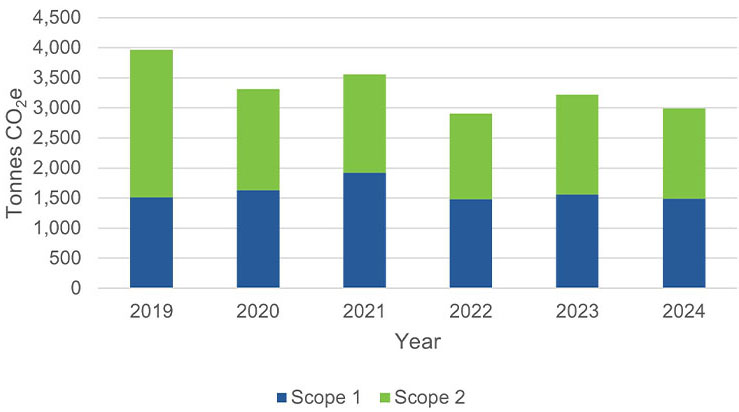
| Council scope 1 and 2 emissions by year | Tonnes CO2e |
|---|---|
| 2019 | 3966 |
| 2020 | 3316 |
| 2021 | 3554 |
| 2022 | 2906 |
| 2023 | 3218 |
| 2024 | 2989 |
During the 2023 to 2024 year the council re-aligned its greenhouse gas emission ambitions for the organisation to be net zero by as close to 2030 as possible. Since 2019, the council has achieved an average emissions reduction of 163 tonnes CO2e a year. To achieve net-zero emissions by 2030, this rate of emissions reduction will need to triple.
Scope 3 emissions are the greenhouse gas emissions resulting from upstream and downstream activities such as purchased goods and services and leased assets. Scope 3 emissions account for a large proportion of the council’s overall emissions footprint. These emissions are hard to quantify, and activities are underway in the council to report on them annually.
Estimates for territorial CO2e emissions for local authority areas are provided by the Department for Energy Security and Net Zero (DESNZ). Data is released annually approximately 18 months in arrears. Reporting started in 2005, and the most recent data that is currently available is for 2023. It is anticipated that data for 2024 will be published in June 2026.
Figure 2 below charts estimated Bracknell Forest borough emissions against the projected emissions required to achieve the UK target of a 68% emissions reduction by 2035, against a 1990 baseline. Bracknell Forest borough emissions were 357.7 kilotonnes CO2e in 2023. This is down by 29.4 kilotonnes CO2e from the previous year, and 6.7 kilotonnes CO2e above the projected 2023 emissions required to achieve the UK target of a 68% emissions reduction by 2035.
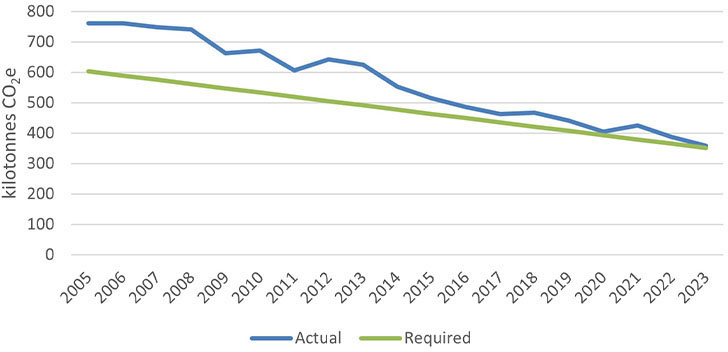
| Year | Actual | Projected |
|---|---|---|
| 2005 | 761.8 | 603 |
| 2006 | 761.2 | 589 |
| 2007 | 748.1 | 575 |
| 2008 | 740.4 | 561 |
| 2009 | 663.3 | 547 |
| 2010 | 671 | 533 |
| 2011 | 606.3 | 519 |
| 2012 | 642.2 | 505 |
| 2013 | 625.4 | 491 |
| 2014 | 552.4 | 477 |
| 2015 | 514.2 | 463 |
| 2016 | 485.9 | 449 |
| 2017 | 463.2 | 435 |
| 2018 | 466.5 | 421 |
| 2019 | 441.1 | 407 |
| 2020 | 404.1 | 393 |
| 2021 | 424.5 | 379 |
| 2022 | 387.1 | 365 |
| 2023 | 357.7 | 351 |
During the 2023 to 2024 year the council re-aligned its greenhouse gas emission ambitions for the borough to be net zero by as close to 2030 as possible. Since 2005, the borough’s territorial emissions have decreased by an average of 22.45 kilotonnes CO2e a year. To achieve net-zero by 2030, this rate will need to more than double to 51.1 kilotonnes CO2e a year.
Figure 3 provides a breakdown of Bracknell Forest’s 2023 territorial emissions by sector. Domestic energy (36.6%) is the largest source of emissions in Bracknell Forest, followed by transport (34.95%). Domestic housing and road transport account for the majority of these emissions respectively.
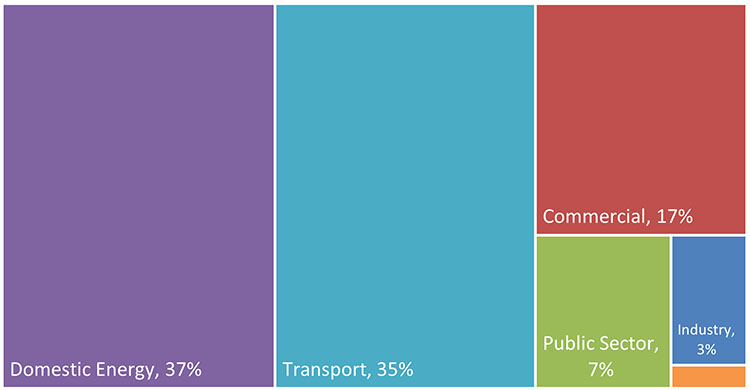
| Area | Percentage of emissions | Kt CO2e |
|---|---|---|
| Industry | 3% | 12.3 |
| Commercial | 17% | 61.2 |
| Public Sector | 7% | 25.9 |
| Domestic Energy | 37% | 131 |
| Transport | 35% | 125 |
| Agriculture | 0.60% | 2.2 |
Bracknell Forest’s emissions per capita for 2023 were 2.8 tonnes CO2e. This is down from 3.0 tonnes CO2e in 2022. This is also lower than the 3.2 tonnes CO2e average for south-east England, and 3.3 tonnes CO2e for England nationally.
Figure 4 below helps to contextualise these emissions by showing several different activities that each release 1 tonne CO2e.
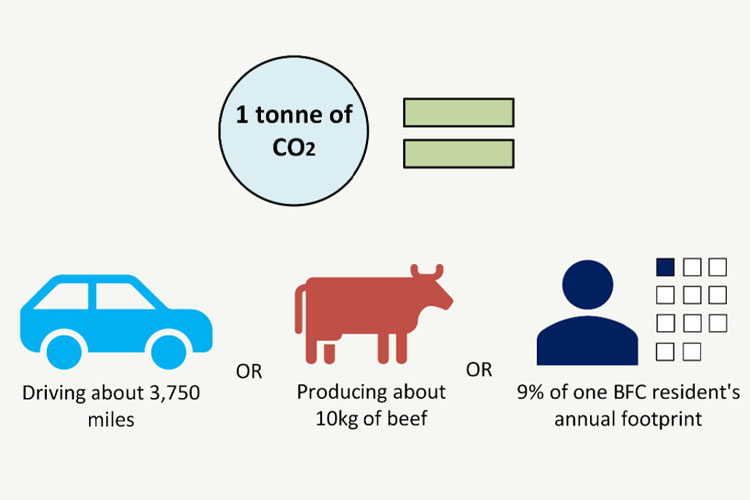
A highlight of the council’s climate change activity this year has been the creation of a new climate change strategy covering our activities from 2025 to 2030. This includes a delivery plan to show how we will implement the first phase of the strategy.
The development of this new strategy was supported by the creation of 4 background research papers and a programme of engagement which involved in-depth workshops and surveys with councillors, council staff, and residents.
Residents, local organisations, councillors and council officers were consulted on the draft strategy from 11 December 2024 to 26 January 2025. Read the consultation report.
Information on the aims, principles and delivery is available in our climate change strategy executive summary.
77 households in Bracknell Forest have benefitted from council-backed schemes that fund or support home energy efficiency and low-carbon energy installations.
HUG2 provided funding for local authorities to improve the energy performance and heating systems of off-gas grid homes. The funding was targeted at low-income households. At the end of 2024 the scheme closed to applications. 15 households in Bracknell Forest have benefitted from HUG2 funding.
Bracknell Forest Council fund home energy efficiency improvements for residents with long-term health conditions and disabilities that leave them vulnerable to the cold. 7 households have received or have been approved for funding.
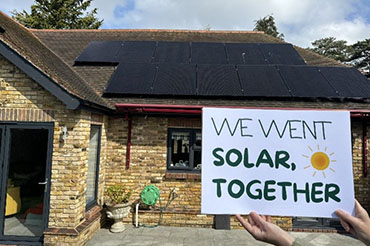
For the second year, Bracknell Forest residents were able to participate in Solar Together. A group-buying scheme for solar panels, Solar Together offers high-quality installations at a competitive price. As of June 2025, 48 households have had solar panels or battery storage installed under the scheme, and 7 households have installations scheduled.
Work has been undertaken in 2024 to 2025 to prepare for retrofit schemes that are scheduled to be launched in 2025 to 2026:
Bracknell Forest Council joined a consortium bid led by Portsmouth City Council for Warm Homes: Local Grant funding. The funding is for local authorities to deliver energy performance and low carbon heating upgrades to low-income homes. The consortium was awarded £26,037,063 for a 3-year period. This funding will be used to fund retrofit measures across 32 local authority areas, meaning only a small proportion will be allocated to Bracknell Forest Council. Delivery of the scheme was expected to start in May and June 2025.
The procurement of a managing agent to administer ECO4 and GBIS funding through the Local Authority Flexibility referral process (Flex) has been approved. Funded by energy companies, these schemes provide energy efficiency improvements to homes that have poor energy performance, with a focus on low-income and vulnerable households. The Flex process enables Local Authorities to expand the eligibility criteria of the schemes to help more residents, and the managing agent will oversee the processing of these applications in Bracknell Forest. It is anticipated that the managing agent will start activity in 2025 to 2026.
Planning has been undertaken by the Public Protection Partnership to launch a project to investigate non-compliance with Domestic Minimum Energy Efficiency Standard (MEES) regulations. MEES regulations set a minimum energy efficiency level for domestic private rented properties. The aim of the project is to increase compliance and to provide reassurance to those renting a property in the area. The project is expected to launch in 2025 to 2026.
A free energy advice service provided by Green Doctor has been made available to residents in Bracknell Forest. Run by the charity Groundwork South, the service helps residents to save money on energy bills, switch energy providers, claim grant support, get prepayment meter support, and reduce energy and water debt. In 2024 to 2025, the Green Doctor service supported 34 households in total with energy saving pledges and energy saving measures. This equated to:
Bracknell Forest Council utilised the Household Support Fund to help residents with the cost of food and energy in the winter. Funding allocated to Green Doctor’s Extra Winter Support initiative and the work of First Days involved the provision of items to families in need to help make their homes more energy efficient and reduce energy usage and costs. This included the provision of energy efficient light bulbs, draught excluders, radiator foil and heated under-blankets.
7 thermal imaging cameras have been purchased by Bracknell Forest Council and will be available to loan from libraries across the borough from Autumn 2025. This follows the success of the 2 thermal imaging cameras gifted to Crowthorne Library by Crowthorne Parish Council and Crowthorne Reduce Our Waste (CROW). 31 residents borrowed the 2 thermal imaging cameras between 24 January 2025 when the scheme was launched and 31 March 2025, with positive feedback.
Council officers and councillors have attended workshops and seminars hosted by Scottish and Southern Electricity Networks (SSEN) to learn how to use the new Local Energy Net Zero Accelerator (LENZA) platform. SSEN are responsible for the distribution of electricity in the borough, and the LENZA platform can be used to support strategic energy planning for the local area.
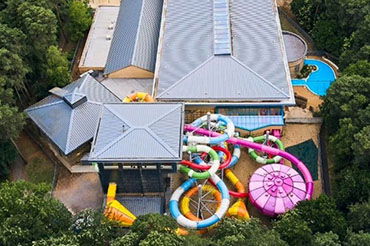
Renewable energy installations and energy efficiency measures have been planned or undertaken across several council buildings:
Display Energy Certificates (DECs) and advisory reports have been used to identify priority sites for carbon emissions reduction measures.
A Decarbonisation Working Group has also been established to further develop and coordinate energy efficiency initiatives and explore opportunities for renewable energy generation across the corporate estate
New developments associated with the council have been built or are being built to high sustainability standards:
52 energy-efficient homes with solar PV panels have been built at Coopers Hill. These affordable homes have been built by the Bracknell Forest Cambium Partnership, a joint-venture (JV) partnership between Countryside Partnerships (part of Vistry Group) and Bracknell Forest Council. The development also includes cycle parking bays and electric vehicle charging.
The construction of 81 affordable homes in Bracknell town centre, overseen by the Bracknell Forest Cambium Partnership, are also underway. These homes will also feature solar PV panels, electric vehicle (EV) charging points, AAA-rated appliances in all homes and secure cycle spaces.
The redevelopment of the Commercial Centre incorporated a green roof, solar PV panels, LED lighting and EV chargers.
Binfield’s new health and community centre was built to a Building Research Establishment Environmental Assessment Method (BREEAM) Very Good standard and incorporates air-source heat pumps, solar PV panels and EV chargers.
The construction of Bridgewell supported living accommodation is being delivered to BREEAM Excellent standards. This includes the installation of solar PV panels.
A new specially resourced provision (SRP) at Edgbarrow School is under construction and is due to be completed by the end of December 2025. The new provision will be built to BREEAM Good standard and incorporate solar PV panels and LED lighting.
Approved new developments associated with Bracknell Forest Council have also been planned to high sustainability standards:
Bracknell Forest Council and Warfield Parish Council have reached a partnership agreement and have agreed a procurement process to deliver a new community hub for Warfield. The new hub is planned to be built to a BREEAM Excellent standard and will be operationally net-zero.
Hawthorn Academy will be a new state of the art social, emotional and mental health (SEMH) special school in Warfield. The new school will be designed to a BREEAM Very Good standard and will incorporate an air-source heat pump, LED lighting, solar PV panels and potentially a green roof. The project is due to be completed by December 2026.
Feasibility for the installation of an EV charging hub, battery generation station and solar PV panels on the London Road landfill site has been completed. SSEN have currently quoted a cost of £1.63 million for the connection to the mains grid. External funding, or an alternative approach to connection such as by working with an Independent Distribution Network Operator (IDNO), will need to be explored to progress this project further.
Throughout 2024 to 2025, the new Local Transport Plan (LTP4) has continued to be developed, which will cover the period 2024 to 2037. In November 2024 a draft of the new plan was published for public consultation and the new plan is to be formally published in 2025.
The new plan will shape future transport schemes and development, with a vision ‘to develop a sustainable, integrated and resilient transport network that reduces carbon and provides choice and access for all in a safe and healthy environment, making Bracknell Forest a desirable place to live, work and grow.’
With a focus on cleaner travel and the reduction of carbon emissions, the new plan aims to:
View the new Local Transport Plan.
Ringway, who are our highways and street lighting contractor, have been undertaking carbon reduction initiatives as part of their highways operations. These include:
The transport team at the council have been working with a range of delivery partners to support and encourage walking and cycling in the borough.
246,362 Love to Ride cycle miles were logged in 2024 to 2025. This was supported by:
Organised by Trek, Avanti Cycling, Bracknell Forest Council and The Lexicon, the inaugural Bracknell Cycle Festival was held on the 14 September 2024 in Bond Square. The event involved activities that included bike demonstrations and training, repair stands, and active travel and community stalls.
The Bracknell Cycle Festival took place again in June 2025.
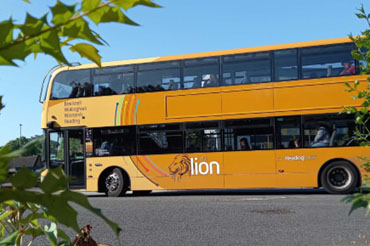
An updated Bus Service Improvement Plan (2024 to 2037) (BSIP) was published in June 2024. The aim of the new plan is to grow patronage, improve reliability and journey times, make fares and services easier to understand and access, and deliver better value for money. Developments since its publication include:
EV usage continues to grow in the borough. This year:
Officers have been working on a submission to the Local Electric Vehicle Infrastructure (LEVI) fund that will support the installation of charge points at greater scale across the borough.
A number of initiatives have been completed or are underway to assist with the decarbonisation of staff travel, the council fleet, and the vehicles of contractors:
The rangers’ team have moved 2 vehicles over to HVO fuel from diesel. Their other 3 vehicles are fully electric.
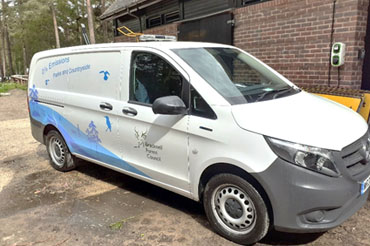
A HVO trial for a waste vehicle has found a 78% reduction in emissions compared to diesel fuel. While currently being 13% more expensive to run, the success of the trial inspired the adoption of HVO fuel by the rangers’ team.
A new procurement framework is being developed for 2025 to 2026 to make sure that replacement vehicles will be EV. This will include a provision for external operators and contractors to do the same.
A staff travel survey was launched to inform an update of the council's own Travel Plan. 522 responses were received. The findings of the staff travel survey have helped to inform the development of initiatives. This includes an EV car leasing scheme for council staff that was launched in April 2025.
A new Biodiversity Action Plan (BAP) for 2024 to 2029 has been approved. The plan outlines key actions to protect and enhance biodiversity across the borough. The plan has 68 targets across 6 habitat themes. The themes and some of the targets within them are:
View the new Biodiversity Action Plan.
The Thames Basin Heath Special Protection Area (SPA) Supplementary Planning Document (SPD) has been updated and gone through public consultation. The aim of the aim of the SPD is to provide guidance to make sure that new development does not have adverse effects on the SPA. The Berkshire Local Nature Recovery Strategy (LNRS) has also gone through public consultation. LNRSs are spatial strategies to recover nature across England.
Bracknell Forest Council were recently awarded Responsible Body (RB) status, enabling the council to enter into conservation covenant agreements with landowners in England to help protect and enhance the natural or heritage features of the land. Due to capacity constraints this work is likely to be limited to sites within Bracknell Forest. The council have also implemented a new multi module system to support Biodiversity Net Gain and tree conservation.
Throughout the year the parks and countryside team, supported by volunteers and contractors, have undertaken a range of work improving and conserving biodiversity and nature across the borough.
This work includes removing invasive species from woodland, wildflower seeding in grassland, hedge planting, mixed native tree planting, pond silt removal, the creation of roadside nature reserves, and hedgehog conversation. Adaptation measures, such as the mulching of planted trees to improve water supply and retention and the assessment of maintenance areas to align with changes to growth patterns, are also now part of regular working procedures.
Run in partnership with Involve, the Green and Active Project has organised conservation activities for volunteers across the year to support the work of the council’s parks and countryside team and other local environment groups. This year 2,832 hours of volunteering have been achieved through the Green and Active Project.
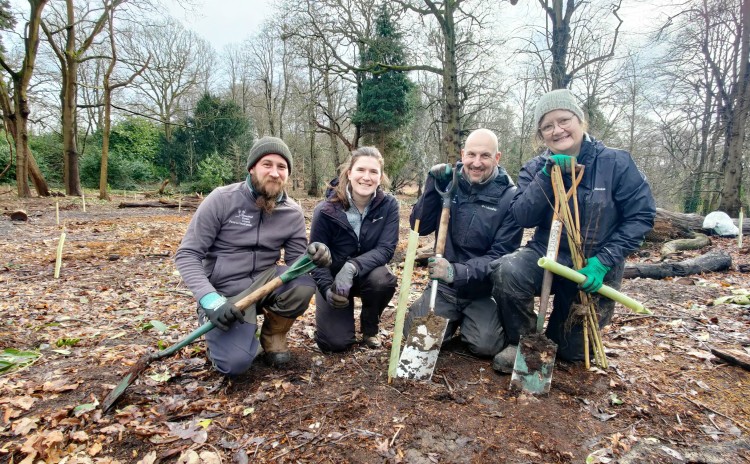
The planting of mixed native trees has taken place across the borough throughout the year. This work has included the establishment of a new community orchard at Peacock Meadows. This year 8,720 whips and standards have been planted by the parks and countryside team in the borough.
With the help of volunteers, specific species are monitored to help inform site management and conversation. Some key findings from the 2024 survey include:
Buckler’s Forest won an award for the Best Wildlife Site at the Land Trust conference in July. This is in recognition of the rare and exceptional species that live in the rich mix of habitats there. Bracknell Forest Council and The Lexicon have also been recognised as a Bees’ Needs Champion in 2024. Run by the Department for Environment Food and Rural Affairs (DEFRA), the environmental awards acknowledge the exceptional efforts local authorities, community groups, farmers and businesses have made to support pollinators.
In addition to a sustainable fleet of HVO-fuelled and electric vehicles, the rangers team now use electric tools, an e-bike for short journeys and have constructed fences in-house and by hand with locally sourced wood.
The Bracknell Forest Local Plan (BFLP) has been in place for a year. The Authority Monitoring Report (AMR) for the period 1 April 2023 to 31 March 2024 has assessed the performance of policies during the last year of the previous Local Plan. RAG scores (standing for red, amber, green) are used to rate the performance of policies. Green means that the policy has achieved or exceeded its target, amber means that it has slightly underachieved its target but is not a concern and red means that it has not met its target and requires attention.
The RAG (red, amber, green) scores of relevant policies are:
Additional planning guidance is in the process of being developed to provide detailed advice and best practice guidance to supplement the climate change related policies in the BFLP.
The Bracknell Town Centre Masterplans Supplementary Planning Document (SPD) has been adopted to provide land use and design guidance for 3 strategically important development sites in Bracknell town centre. The SPD contains several sustainability principles, which focus on active travel, green and blue infrastructure, buildings, and materials.
Overall waste for 2024 to 2025 has been 49,400 tonnes. This is an increase of 1,400 tonnes from the previous year. This is attributable to the recovery of the economy and the resultant increase in consumption. Much of this increase has been in non-recyclable waste, which explains:
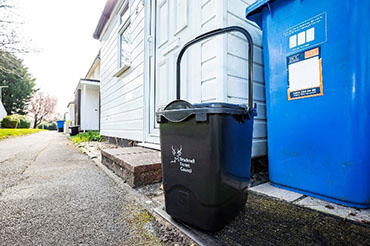
Total food waste collected for 2024 to 2025 was 5,259 tonnes, which is an increase of 90 tonnes in comparison to 2023 to 2024.
Food waste collection in flats has continued to be rolled out throughout the year. 6,600 flats in the borough now have food waste collection, compared to 1,800 in 2023 to 2024. The aim is to provide all flats with food waste collection by 31 March 2026.
Waste collection emissions for 2024 to 2025 were 401 tonnes/CO2e. This is a decrease of 24 tonnes CO2e compared to the previous year. The trial of using Hydrotreated Vegetable Oil (HVO) to fuel a waste vehicle has contributed to this decrease, having resulted in a 78% reduction in emissions compared to diesel fuel. Waste disposal emissions data for 2024 to 2025 were not available at the time of this report.
The council’s waste team and contractors continue to support and encourage waste reduction, reuse, and recycling in the borough:
The ‘Introduction to Climate Change’ online learning course was updated and made mandatory for all council staff. This course engages staff on what climate change is, the evidence for it, and what is happening at an international and national level. From April 2024, 692 additional council staff completed the course. 365 of these completions have been since the course was made mandatory on 24 February 2025.
A new ‘Climate change in Bracknell Forest’ online learning course has also been created to engage staff on why climate change matters to Bracknell Forest, and what we can do in the borough to tackle climate change. This new online learning course was launched in June 2025.
20 members of council staff gained carbon literacy accreditation in 2024 to 2025. Carbon literacy training offers participants the opportunity to better understand the carbon costs and impacts of their everyday activities, and the course was tailored to the local authority context.
6 members of council staff have completed a carbon literacy train-the-trainer course to deliver carbon literacy training to council staff in 2025 to 2026.
4 meetings of the Officer Climate Network were held in 2024 to 2025. These meetings offer council staff the opportunity to hear and engage with council climate action activities and connect with colleagues who are also interested in climate action. Meetings this year engaged with subjects that included:
The council has been developing an Integrated Impact Assessment Screening Tool (IIAST) to enable staff to assess the impact of decisions and projects in the areas of climate change and sustainability as well as health, wellbeing and equality. The tool has been successfully trialled with teams across the organisation.
Once complete the tool is planned to be introduced into the council processes to provide decision-makers with robust information on climate change and other considerations.
The Bracknell Forest Council Social Value Policy has been adopted to consider the environmental, economic and social impacts of contracts. All contracts with a value over £150,000 are now required to include at least 1 social value target.
The council’s IT team have been investigating and actioning changes to reduce the carbon footprint of the council’s IT operations. This has included:
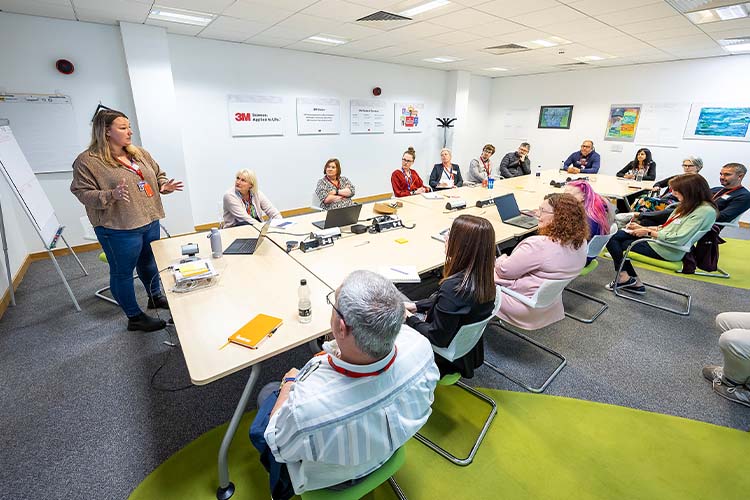
The second Bracknell Forest Climate Change Summit took place on Monday 8 July 2024 at the 3M Centre in Bracknell.
With the theme ‘Bracknell Forest: Uniting for Climate Action, Transforming Our Community Together’, the summit brought together around 140 representatives of local businesses, charities, community groups, schools and residents, as well as councillors and council staff.
A collaboration between Bracknell Forest Council and the Joint Climate Action Board (JCAB), attendees had the opportunity to co-create a vision statement for Bracknell Forest’s Community Climate Emergency Strategy (CCES). The CCES is being created and implemented by the JCAB, and will support the borough’s transition to net-zero.
Attendees had the opportunity to participate in workshop sessions designed to help them to identify practical actions that can be taken to tackle climate change. These workshops were facilitated by experts and specialists in relevant fields.
A “marketplace” area with stalls also showcased climate and sustainability initiatives and the work of community groups, businesses, JCAB working groups and council teams.
Key statistics on the success of the Climate Change Summit include:
View the climate change summit report.
An estimated 90 pupils from 20 schools attended the primary and secondary schools’ climate conferences that took place in July 2024. The aim of the conferences was to inspire children in the borough to take action at school, at home and in the community. The conferences were organised by Sustainability and Environmental Education (SEEd), with the primary schools’ conference being facilitated in collaboration with The Harmony Project.
The primary schools’ climate conference was held on 12 July at Garth Hill College. Around 40 pupils from across 14 schools were in attendance. A report on the 2024 primary schools’ climate conference has been published and includes the action plans that the pupils wrote for their respective schools.
The secondary schools’ conference was held on 11 July at Sandhurst School. Just under 50 pupils from across 6 schools were in attendance. A report on the 2024 secondary schools’ climate conference has been published and includes the sustainability goals that the pupils created for their respective schools.
The launch of PACTS, which stands for Politicians Accountable for Climate to Students, was attended by a teacher and 2 pupils of Kings Academy Easthampstead Park. An invitation was extended following the secondary schools’ climate conference. PACTS aims to transform how students understand and engage in the political cycle. The pupils were able to talk to an MP and a Peer from the House of Lords about their issues and concerns.
6 schools from Bracknell Forest attended the Climate and Nature Action in Education event at the University of Reading in September 2024. An invitation was extended following the 2024 Bracknell Forest Climate Summit. The aim of the event was to help drive climate and nature action planning in all education settings.
Fully funded resources for the Eat Them to Defeat Them programme were made available for 6 state-funded primary schools in Bracknell Forest. An award-winning initiative, the programme encourages children to eat more vegetables through fun and engaging activities.
The climate change team supported the integration of sustainability considerations into a new community cookbook. Created by Frimley Health NHS Foundation Trust, the community cookbook offers a range of healthy recipes for residents to use.
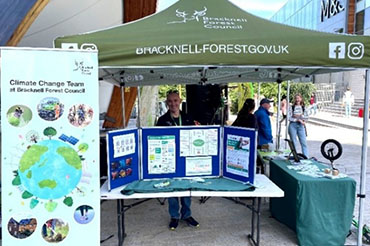
The climate change team attended a range of events across the borough, engaging residents on the council’s climate change work and initiatives that they can benefit from and be a part of. These events included:
Bracknell Forest Community Climate Action (BFCCA) has been established as the umbrella organisation for the JCAB, the 10 Working Groups and borough-wide cooperation and action on climate change. The group has begun proceedings to apply to be a Charitable Incorporated Organisation (CIO). This will make it a charity governed by a board of trustees.
BFCCA have organised and been involved in a range of activities. Highlights include:
In collaboration with Nesta, supported by Bracknell Forest Council and funded by the Calouste Gulbenkian Foundation, BFCCA hosted 10 Strategy Rooms in the Bracknell Forest area. The Strategy Room is an immersive experience that gave residents the opportunity to inform BFCCA’s emerging CCES. Around 100 people were engaged across all the sessions. View the data from the Strategy Rooms in Bracknell Forest.
BFCCA submitted a proposal for £1.25 million to the Climate Action Fund, which is offered by The National Lottery’s Community Fund. The objective of the proposed project was to engage, educate and empower the residents of Bracknell Forest to take climate action in their everyday lives. The proposal was written in collaboration with Bracknell Forest Council, Involve, and the RECLAIM Network as well as 7 project partners and 13 community partners. The BFCCA were notified in May 2025 that the bid was unsuccessful.
The 10 Working Groups that support BFCCA and the JCAB have also overseen their own projects and initiatives. Highlights include:
Supported by the council, the Education Working Group organised a free Climate Action Plan workshop for local schools. Facilitated and delivered by Gemma Bailey from the University of Reading and the Climate Ambassadors Scheme, the workshop provided resources and support to school representatives to aid them in the development of climate action plans.
The Housing Working Group have collaborated with Heat Collector, a heat pump installer, to create a mobile heat pump display. This display has already been used to engage residents with heat pump technology in Bracknell town centre.
Throughout the year, the communications and marketing team at Bracknell Forest Council have played a key role in promoting and driving engagement with a range of climate change and sustainability initiatives. These include:
Newsletters and publications focused on climate change and sustainability have included:
Filming was undertaken with a resident that had an air-source heat pump, solar PV panels, wet central heating and heating controls installed through HUG2. The video content will be used to promote retrofit measures and future funding opportunities in 2025 to 2026 and beyond.
The climate change team coordinated inputs and responses to the 2025 Climate Action Scorecards, which are undertaken by Climate Emergency UK. The scorecards are used to assess all UK councils on the actions they have taken towards net zero. Climate Emergency UK have acknowledged and promoted Bracknell Forest’s proactive approach to the climate scorecards.
In June 2025, the 2025 Climate Action Scorecard results were released. Bracknell Forest Council scored 42%, which was above the average for a single tier local authority which was 41%.
While the average single tier local authority had increased its score by 6% compared to the 2023 results, Bracknell Forest Council had increased its score by 15%. This demonstrates a significant improvement in the climate action of Bracknell Forest Council in the past 2 years.
In comparison to 2023, the council significantly increased its score in 5 of the 7 categories. The council increased its score for Governance and Finance by 36% and was one of the most improved councils in this category. The council’s highest scoring section was Collaboration and Engagement, where it scored 72%.
Bracknell Forest Council have been invited to participate in an assessment of action on climate change and health for the Association of Directors of Public Health South-East Network. The study will capture actions that councils are taking on climate change and health and the barriers and facilitators involved to inform recommendations.
Our 2025 to 2026 Climate Change Action Plan sets out what Bracknell Forest Council will do in the year to March 2026 to implement the Climate Change Strategy. This corresponds to phase 1 of strategy delivery, with a focus on quick wins and enabling work such as planning, research, exploratory work and capacity and relationship-building.
The action plan draws on the Phase 1 Delivery Plan we published along with the strategy, which sets out in broad terms what we could look to deliver to establish a concrete programme of work for the year with clear deliverables. It explains what we will do to support each aim and enabler of the strategy.
| Attachment | Size |
|---|---|
| 412 KB |
We will monitor progress on delivering the action plan through quarterly meetings of a refreshed Climate Change Officers’ Board and biannual reports to Cabinet and the Joint Climate Action Board and will make public a full annual report on our progress following the end of the year.
On 26 February 2025 the council’s 2025 to 2026 budget was approved. Significant investments are being made by the council to support delivery of the action plan and to build on climate-related activities started in previous years:
Below is a summary of the key activities and projects of the action plan.
We will:
We will:
We will:
We will:
We will:
We will:
We will:
We will: